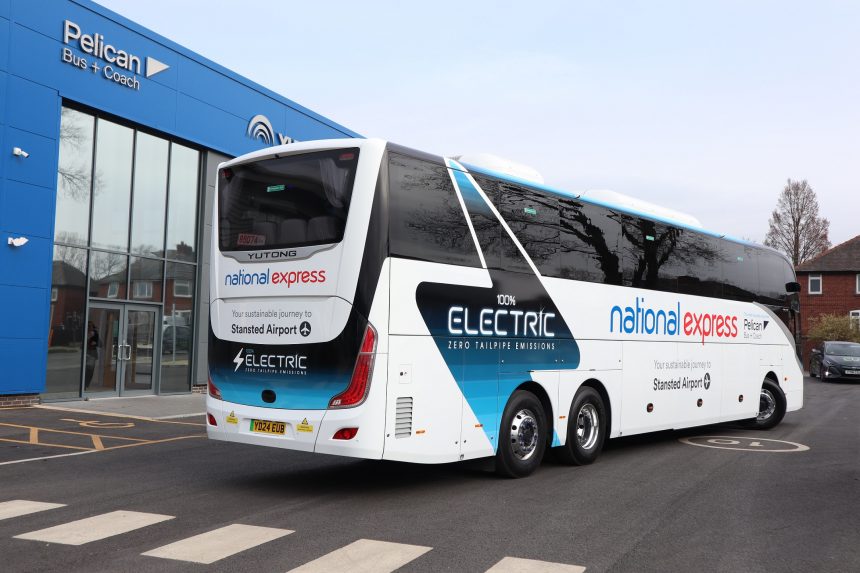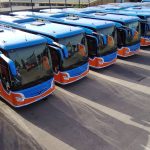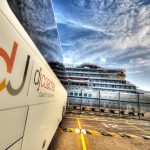Over the last five years, nearly 100 zero tailpipe emission coach orders have been placed in the UK. Over 50 are currently at work, deployed in a variety of scenarios including on scheduled services, domestic tourism, and staff shuttles where corporate entities look to improve their sustainability credentials.
Despite registrations beginning to grow, zero tailpipe emission coaches remain a tiny minority of overall annual registrations (compared to over 50% for zero-emission buses). The lack of widespread grant funding and availability of suitable vehicle models have both been key to restricting growth.
Diesel coaches have the flexibility of range and carrying capacity for luggage and passengers. Zero-emission coaches face the challenge of matching that range without impeding on capacity, a technological headache that manufacturers continue to grapple with.
However, recent developments show that there are reasons to be optimistic as those manufacturers rise to the challenge of meeting operator requirements with new zero tailpipe emission models.
In February, Pelican Bus and Coach unveiled the recently announced Yutong GTe14 battery-electric coach to be trialled by National Express between London and Stansted Airport. It builds on the only other battery-electric coach available, the Yutong TCe12, with increased range and carrying capacity alongside a fast-charging capability that is expected to be of up to 600kW.
This follows the launch of the Irizar i6S Efficient Hydrogen and the Temsa Caetano HD hydrogen fuel cell-electric coaches at Busworld Brussels 2023, both with a claimed range of up to 1,000km.
Projects across Europe will add further solutions in years to come, including a hydrogen fuel cell-electric coach being developed by Wrightbus and the creation of two zero tailpipe emission demonstration vehicles as part of the Daimler Buses-led Electrified Coach project.
While long-term coach decarbonisation will inevitably focus on new vehicles, there remains a significant legacy fleet that requires near-term solutions for greenhouse gas (GHG) abatement.
Repowering to zero tailpipe emission is seen as an emerging solution and it provides a cost-effective option for operators compared to buying new, helping to accelerate the shift away from ageing diesel fleets sooner while saving on overall lifecycle carbon emissions by extending the useful life of the existing asset.
In 2023, Equipmake announced a partnership with Westway Coaches to repower examples of its fleet, offering range to meet requirements while not affecting carrying capacity. Zemo Partnership and the Energy Saving Trust recently launched the Zero Emission Vehicle Repower Accreditation Scheme (ZEVRAS) to further support the market by ensuring that repowered vehicles meet a range of technical requirements.
Low carbon fuels like hydrotreated vegetable oil (HVO) provide an immediate solution for legacy fleets, too.
To support their adoption, Zemo operates the Renewable Fuels Assurance Scheme (RFAS) to provide operators with independent verification of low carbon fuel supply chains in terms of GHG emission performance, renewable blend composition, and feedstock sustainability.
The scheme enables fleet operators to understand credible GHG savings figures that can help to inform decision making processes regarding fleet decarbonisation by demonstrating the merits of sustainable low carbon fuels.
The continued lack of widespread funding for purchasing zero tailpipe emission coaches and incentives to adopt low carbon fuels, combined with challenges associated with electrifying depots, will continue to hold back the decarbonisation of coaches.
Nevertheless, pioneering operators continue to push the boundaries of what is possible today, instead of focusing on what cannot be achieved.
Time will tell if 2024 is the year to really kickstart coach decarbonisation. One thing is for sure: Momentum behind the decarbonisation agenda among operators and manufacturers alike continues to grow.



























